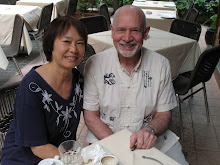I first noticed symptoms of what was later diagnosed as MSA-C in August of 2006. I had just moved to Hong Kong for a teaching job and had gotten new glasses shortly after arriving there. I noticed a slight depth of field problem, such as stepping off street curbs and not judging the curb's edge correctly, some periodic blurring of vision, etc. I thought it was the glasses that were the problem and didn't do anything about correcting the problem until the following summer vacation (school holidays--July of 2007)and found that my glasses were not the problem.
I began to follow up with routine blood tests, which were all normal. Then came a series of scans--CT and PET scans in the fall of 2007, which showed a slight deterioration of the right cerebellum, resulting in a generic diagnosis of "cerebellum atrophy", and then an MRI in November of 2008, which resulted in a tentative MSA-C diagnosis. This diagnosis was confirmed by Dr. Fahn of The Neurological Institute at Columbia University Medical Center in New York. Additionally, an autonomic test, conducted during my visit to NYC, showed findings that are consistent with but not specific for early autonomic failure or autonomic neuropathy. Cancer, for now, has been ruled out, based on blood tests and scans that have been performed to date.
Other early signs of a problem, besides the vision issues discussed above, were noted by both my son and my husband. As early as August of 2006, my son helped me with my move to Hong Kong and recalls that he noted that I tended to walk with an abnormally wide stance. My husband joined me in Hong Kong in January of 2007, and he observed the same wide stance that my son says he had noted earlier. Another incident in January of 2007, thinking back, that may have been an overlooked indicator of problems to come was a bowling outing with some of my teaching associates. I guttered roughly every other ball, and I wasn't able to make the necessary adjustments. I now realize that I may have been experiencing the first signs of not being able to control my right hand.
Current symptoms, likely associated with this disease, include:
* Gait difficulties and imbalance
- Wide-based stance for balance
- Use cane when walking or furniture & walls when walking around the house
- Right side of body, including right leg "feels" weaker, at least less control
- Right-sided cerebellar dysmetria, with intention tremor and past-pointing
* Vision
- Still some depth of field difficulties
- Perceived increased sensitivity to bright lights and sunlight
- Hand-eye coordination slower, especially when using right hand
* Hands & Feet/legs
- Difficulty controlling right hand & right leg
- Right handed, but currently write using left hand
- Finger-to-nose and heel-t0-shin are moderately dysmetric on the right, mild on
the left; also dysdiadochokinesia, R>L
* Light headed or faint
- Not dizzy, but sometimes light headed when climb stairs of get up quickly
* Voice
- Mildly slurred; cerebellar speech
* Autonomic Functions
- Mild autonomic dysfunction with likely asymptomatic orthostatic hypotention
* Dreams
- Acting out of dreams is moderate and periodic;
- Talk in sleep sometimes
* Cognition
- Normal
* No Parkinsonian signs
- Tone, power: normal
- Reflexes: reduced
- Plantars: both downgoing
Current Therapies:
Although I am still able to get around with the help of my husband and/or a cane, or by using furniture and walls while walking around the house, my condition has been steadily worsening. I am currently working on my speech difficulties with a speech specialist using the Lee Silverman Voice Treatment (LSVT), as well as beginning Physical Therapy again (I also had some PT while in Hong Kong. In addition, I am in counseling and am looking at the possibility of participating in support groups.
Next Post:
I'm hoping to discuss our search for potential treatments of MSA-C, including stem cell treatments, in my next post. Anyone who has researched or had stem cell treatments is encouraged to post your experiences here, in advance of my next post on the subject, as we are currently investigating stem cell treatment results (anecdotal as well as documented)in contemplation of pursuing stem cell therapies outside of the U.S.
